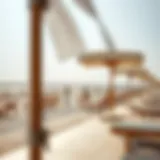Latest Trends and Developments in Dubai Real Estate


Intro
Dubai has long been considered a hotspot for real estate investment. The emirate's dynamic urban landscape continuously evolves, shaped by ambitious projects and a robust investor interest. As more people look to the Middle East for opportunities, understanding what’s happening in Dubai's real estate market has never been more crucial. The following sections will unpack the latest developments in this vibrant sector.
Market Trends
Current Real Estate Market Conditions
The real estate climate in Dubai is shifting gears as developers get creative and investors adapt to new dynamics. With property prices witnessing a noticeable uptick in the past year, many experts are keenly observing the influx of international investors. Notably, luxury and mid-range properties are flying off the shelves, indicating a rising demand. Areas like Dubai Marina and Downtown are still considered prime spots, while emerging communities such as Dubai Creek Harbour are gaining traction.
This activity is not solely due to local interest; global factors play a significant role. Political stability, favorable visa regulations, and a thirst for lifestyle enhancements are drawing buyers from all corners of the globe. Moreover, the ongoing efforts to diversify the economy beyond oil have sparked interest in property investments, driving demand higher.
Future Projections and Growth Areas
As we look ahead, several growth areas come into focus. The government's commitment to developing infrastructure is setting the stage for future gains. Regions such as Dubai South, which is strategically located near the Expo 2020 site, are expected to see unprecedented growth as connectivity improves. After the Expo, it will continue providing substantial housing options and residential developments.
Furthermore, the rise of the digital economy has led to increasing demands for smart homes and tech-enabled buildings. Investors should keep an eye on projects that offer these modern amenities, which will likely increase in value as lifestyle preferences evolve.
"Investment in Dubai's current real estate market isn't just about capital appreciation; it's about securing a future in one of the world's most dynamic cities."
Investment Insights
Best Areas for Real Estate Investment
If you're considering dipping your toes in Dubai's property market, certain areas could yield the best returns:
- Dubai Marina: Known for its upscale living and vibrancy, this area attracts both affluent locals and expatriates.
- Downtown Dubai: The beating heart of the city, featuring iconic attractions, provides a steady demand for both short-term rentals and long-term leases.
- Dubai South: Emerging as a key player, particularly appealing due to its proximity to Al Maktoum International Airport.
- Dubai Creek Harbour: This waterfront district is in the early stages but holds significant potential as development progresses.
Tips for First-Time Investors
- Do Your Homework: Understanding local laws and regulations can save you a heap of trouble down the line. Knowledge is power, after all.
- Leverage Local Expertise: Enlisting the help of property managers or real estate agents who know the ins and outs of the market can be invaluable.
- Consider Rental Yields: Calculate potential returns before making any commitments. A property with a lower initial cost might yield higher returns.
- Stay Informed: Markets fluctuate. Keeping tabs on news and updates can help you spot the right investment opportunities.
In a landscape as vibrant and evolving as Dubai’s, insight is key. With the proper knowledge and guidance, the realm of real estate can be navigated successfully.
Prelude to Dubai's Real Estate Landscape
The world is watching Dubai as it continues to redefine itself as a hub for international real estate. This topic is especially significant in a time when preferences for urban living are rapidly shifting. Investing in real estate in Dubai is more than just acquiring property; it is about engaging with a dynamic, ever-evolving environment characterized by both opportunities and challenges. The strategic geographical position, impressive architectural feats, and the government's pro-business approach are just a few elements that paint a vivid picture of its market potential.
As a melting pot for cultures, investing in Dubai's real estate allows one to be part of a cosmopolitan lifestyle. Here, buyers are not just purchasing a home, but they are also gaining access to a vast network of amenities, services, and an attractive lifestyle that caters to a broad demographic. This vibrant community is also a significant draw for expatriates and investors from all corners of the globe. The city’s economic climate, underpinned by various sectors such as tourism and finance, has made it a safe haven for investment.
However, understanding the real estate landscape necessitates a closer look at certain key factors. What socioeconomic trends are currently shaping it? What drives the changes in property prices and buyer behavior? By peeling back the layers of this intricate market, potential investors can better navigate their way to successful real estate transactions.
Current Context and Significance
The significance of Dubai's real estate market can’t be overlooked in today’s global economy. The city has been consistently ranked among the top locations for investment, largely due to its favorable policies. The abolishment of certain property ownership laws, coupled with the introduction of long-term visas for investors, has incentivized both local and international buyers. In recent times, there’s been a noticeable uptick in demand, which suggests that the city is not just recovering but is on the rise following the disruptions caused by global events like the pandemic.
Key reasons behind this revival include a growing sense of optimism in the market, as reflected in increased property transactions and higher investment values.
Key Factors Driving Change
Several distinct factors are influencing Dubai's property landscape. Some of these are:
- Government Legislation: Initiatives aimed at boosting foreign investment have created a more welcoming environment for investors.
- Population Growth: The city is becoming increasingly popular among expatriates, leading to heightened demand for both residential and commercial properties.
- Technological Advancements: The rise of smart technology in construction and real estate management is transforming how properties are designed, marketed, and managed. This is particularly evident with the integration of IoT (Internet of Things) in smart homes, enhancing the living experience.
- Environmental Considerations: Sustainability has been a hot topic. The push for green buildings and eco-friendly communities is reshaping how developments are planned and executed.
These factors combined create a diverse and innovative market space, ensuring that Dubai's real estate sector remains attractive and relevant. Understanding these elements not only provides insight into current trends but also prepares potential investors for the challenges and opportunities that lie ahead in this vibrant market.
New Residential Developments
In a city where the skyline seems to reach for the stars, new residential developments in Dubai are not just about erecting structures; they're about crafting living experiences that resonate on multiple levels. For potential residents and investors alike, understanding these developments is crucial. They offer a glimpse into the future of urban living while addressing the needs and aspirations of a diverse population.
The significance of keeping an eye on new residential developments cannot be overstated. They not only highlight the shifting priorities of city inhabitants but also reflect broader economic trends. With a surge in demand for sustainable and innovative housing solutions, these projects often incorporate elements such as energy efficiency, smart technologies, and communal spaces that encourage social interaction.
Key Elements to Consider:
- Evolving Design Trends: The new designs aim for a balance between luxury and functionality, ensuring that residents feel both comfortable and inspired.
- Affordability and Accessibility: Offering a range of options from high-end villas to affordable apartments, there’s something for every pocket.
- Location Benefits: Many projects are strategically located to provide easy access to essential services, urban amenities, and transportation links, making life easier for the residents.
The benefits of these developments extend beyond mere housing options. They contribute to a thriving community atmosphere, sparking economic activities, enhancing property values, and fostering a sense of belonging in a rapidly changing city.
Innovative Housing Projects
Innovative housing projects are emerging as a cornerstone of Dubai's vision for a smart and sustainable city. Gone are the days where the standard apartment layout reigned supreme. Instead, developers are now embracing creativity and technology to cater to the sophisticated tastes of today's buyers. For example, initiatives such as eco-friendly residences integrate solar panels, water conservation systems, and sustainable materials into their construction.
The concept of micro-living is also gaining traction, particularly among younger professionals who prioritize location and lifestyle over sheer space. Thus, developers are designing compact yet functional living quarters that maximize utility without compromising style.
- Smart Home Features: Many new projects implement IoT technology, allowing residents to control lighting, climate, and security remotely.
- Community-Centric Designs: Open areas, parks, and shared facilities make these projects not just a place to live, but a community to thrive in.
Ultimately, these innovative housing projects represent a forward-thinking approach to urban development that aligns with the aspirations of a future-focused Dubai.
Luxury Accommodations and Trends
Luxury accommodations in Dubai are no longer just about opulence; they now encompass a holistic lifestyle experience. Developments like the Burj Khalifa Residences and the Palm Tower Apartments are not merely places to live but rather statements of lifestyle. These projects have redefined luxury to include not just high-end finishes but also exceptional service, security, and privacy.
Current trends indicate that prospective buyers are gravitating towards residential options that offer a blend of luxury and lifestyle amenities.
- Wellness Features: Developers are increasingly incorporating wellness aspects such as spa facilities, fitness centers, and green spaces that promote a healthy lifestyle.
- Unique Experiences: Many luxury developments offer curated experiences ranging from private dining options to exclusive access to events.
The demand for such accommodations highlights the evolving expectations of discerning residents who seek more than just a place to stay; they desire a complete lifestyle package that caters to their individual needs and preferences.
"In Dubai, luxury isn't just a label; it’s an aura that’s intricately woven into the fabric of everyday life."
As new residential developments continue to reshape the landscape of Dubai, they offer investors and homebuyers unique opportunities to be part of this vibrant and innovative market.
Commercial Real Estate Innovations
The commercial real estate sector in Dubai is undergoing a transformative phase, incorporating innovations that enhance functionality, efficiency, and overall market adaptability. In an environment that is increasingly competitive, these developments serve as pivotal elements in solidifying Dubai's reputation as a global business hub.
Innovations in this space not only cater to the demands of modern businesses but also aim to attract foreign investments, thereby boosting the local economy. With technological advancements paving the way for smarter infrastructure and better resource management, businesses stand to gain by integrating these innovative approaches into their operations.
One vital aspect of commercial real estate innovations in Dubai includes the shift towards flexible office environments. This transformation in workspaces is a response to the changing dynamics of the workforce. Companies now recognize the need for adaptive office designs that can swiftly accommodate fluctuating employee numbers and varied work styles.
Moreover, sustainability emerges as a recurrent theme in this arena. Innovations that focus on reducing the carbon footprint of commercial buildings align with global trends of social responsibility. This is significant not just from an ethical standpoint but also in attracting tenants who prioritize sustainability in their selection criteria.
"The future of commercial real estate is not just in selling space; it’s about creating environments that foster collaboration and sustainability."


Office Space Evolution
As the landscape of work evolves, so does the nature of office spaces. The traditional model of fixed, cubicle-style offices is rapidly fading. Instead, many businesses are gravitating toward co-working spaces that encourage collaboration and flexibility. This approach not only caters to smaller startups needing less dedicated space but also benefits larger firms that want to foster innovation without the overhead costs associated with maintaining expansive office layouts.
Key features seen in the evolution of office spaces include:
- Modular designs: These allow companies to reconfigure their spaces easily as their needs change.
- Integrated technology: Smart office solutions, such as touchless access and IoT devices, aid in creating more efficient work environments.
- Focus on wellness: Companies are placing higher emphasis on the physical and mental well-being of employees, incorporating elements like natural light, green spaces, and relaxation areas into their designs.
Investors looking for opportunities in this segment should consider spaces that proactively embrace change. The demand for such innovative designs is steadily on the rise as firms look to outdo the competition.
Retail Developments and Shifts
Retail dynamics are equally shifting within Dubai’s metropolitan framework, largely driven by consumer behaviors and technological integration. The retail landscape extends beyond mere physical presence; it has transformed into immersive experiences that blend e-commerce and physical stores.
New developments often include:
- Experiential retail: Shops now offer unique experiences that can't be replicated online, such as interactive displays and personalized services.
- Mixed-use spaces: Trends indicate a merge between retail, dining, and entertainment, fostering community engagement and enhancing foot traffic.
- Digital integration: Advancements in technology have led to more seamless shopping experiences through apps and online platforms, even within physical stores.
From an investment point of view, understanding these shifts is key to capitalizing on emerging retail spaces. As an investor, keeping an eye on upcoming projects that aim to redefine consumer engagement while maintaining flexibility will prove beneficial in the long haul.
The rapid advancements in commercial real estate innovations mark a critical juncture for stakeholders in Dubai's market. Awareness and adaptability to these changes are essential as the landscape continues to evolve, paving the way for a more sustainable and engaged urban environment.
Market Analytics and Predictions
Market analytics and predictions play a crucial role in understanding the dynamic landscape of Dubai's real estate sector. This component of the article sheds light on the critical data and trends shaping the industry, assisting investors, homebuyers, and property managers in making informed decisions. When one talks about real estate, it is not just about buying or selling property; it’s about grasping the patterns and shifts that indicate the market's health.
Current Market Trends
Right now, Dubai’s real estate market is marked by several standout trends that investors and homebuyers should keenly observe:
- Rising Demand for Luxury Properties: There's a noticeable surge in demand for high-end residential units. Developers are responding by broadening their portfolios, focusing on sustainability and incorporating lavish amenities into their projects.
- Increased Popularity of Affordable Housing: Contrastingly, there’s a growing market segment leaning towards affordable housing options. This shift is particularly appealing to younger professionals and families looking for livable spaces without breaking the bank.
- Moderated Price Growth: After years of rapid price increases, property prices in Dubai have stabilized, which creates a more balanced market for buyers and sellers alike. This stabilization effects investor sentiment positively, allowing for careful consideration rather than rushed purchases.
The real estate sector in Dubai has undeniably become more analytical, with data-driven decision-making becoming the norm. Understanding these trends helps stakeholders anticipate changes, tailor their strategies, and optimize their investments.
Future Outlook and Predictions
Looking ahead, the future of Dubai’s real estate market unveils several predictions based on current analytics and market tendencies:
- Sustained Growth in Investments: Many experts foresee a rebound in property investments as global circumstances stabilize. Investors eyeing Dubai should focus on regions with potential for infrastructure developments. Areas such as Dubai Creek Harbour and the Dubai Marina are predicted to see significant growth.
- Emphasis on Technology-Driven Solutions: Technological advancements will continue to shape how real estate operates. Expect more tools for virtual property tours, leading to increased engagement without the need for physical visits. Integrating smart technology into homes will also likely become a mainstay.
- Sustainability Will Be Key: As urban living comes under scrutiny for its environmental impact, sustainability will dominate future developments. Expect to see more green buildings, energy-efficient designs, and community projects geared toward environmental considerations.
"In the world of real estate, what you know often weighs heavier than what you own."
Keeping an eye on these predictions will empower prospective buyers and investors to make strategic decisions that align with future developments.
In summary, market analytics and predictions not only guide current actions but also prepare stakeholders for upcoming shifts in Dubai’s burgeoning real estate sector. Understanding both current trends and future possibilities provides a roadmap for successful engagement in this vibrant market.
Investment Opportunities
Diving into the realm of investment opportunities in Dubai offers not merely a chance to tap into a burgeoning market, but also to engage with a city defined by rapid growth and diverse offerings. The significance of focusing on these opportunities lies in the unique advantages presented by Dubai's real estate landscape, making it an attractive destination for both seasoned and new investors alike.
Dubai's real estate sector is characterized by its resilient nature and the scope for high returns. Recent developments have spotlighted burgeoning areas that promise both appreciation and rental yield. The city's strategic location, combined with its tactical initiatives – such as tax exemptions and investor-friendly policies – enriches the appeal of such investments. Accordingly, understanding which areas are ripe for investment ensures one does not merely float toward popular zones but instead targets locations set to soar in value.
Moreover, factors like infrastructural advancements, proximity to transport links, and the future development plans of the government often dictate the viability of a market segment. With ongoing investments in various sectors, including retail and tourism, potential investors will find fertile ground for diversifying their portfolios in the vibrant heart of the UAE.
Emerging Areas to Consider
In the ever-evolving landscape of Dubai, certain areas are transforming into hotspots for investment. One notable region is Dubai South, an expansive development aimed at fostering a diverse community. This area houses the Dubai World Central airport, a crucial hub for logistics and travel, making it an attractive prospect for businesses and new residents.
The Dubai Marina area presents another opportunity. Although it has established itself as a go-to locality for luxury living, ongoing projects aim to enhance its appeal further, with waterfront properties expected to gain even more value.
On the flip side, Mohammed Bin Rashid City is expected to feature developments that merge recreational spaces with residential needs. Its proximity to the downtown area makes it an alluring prospect for home buyers and investors aiming for long-term rental yields.
- Dubai South: Home to the airport, diverse community plans.
- Dubai Marina: Established area with further planned enhancements.
- Mohammed Bin Rashid City: Mixing leisure with living, near downtown.
Strategic Investment Approaches
Navigating the Dubai property market is not merely about understanding where to invest; it also involves strategic approaches tailored to maximize return on investment. Potential investors should consider three fundamental strategies:
- Market Research: This is about gaining insights into the trends and price trajectories of specific neighborhoods. Engaging local real estate experts or analyzing market reports from platforms like Bayut.com gives valuable perspectives.
- Diversification: Consider aligning investments across various property types. By investing in both residential and commercial properties, one can spread risk while maintaining potential for returns. For instance, venturing into short-stay rentals could leverage the tourist influx, especially in key areas like Dubai Downtown.
- Timing and Patience: It’s crucial to be patient and adopt a long-term perspective. The Dubai property market can be volatile, influenced by international events and economic fluctuations. A well-timed investment, coupled with patience, can yield significant benefits as the market rebounds.
"In real estate, like in life, perseverance pays off. Those who wait for the right pricing and right property usually find their fortunes."
Investing in Dubai’s real estate is an endeavor packed with opportunities, but seasoned judgment and sound strategies must guide each decision.
Government Policies and Regulations
Government policies and regulations play an essential role in shaping the real estate landscape of any city, and Dubai stands testament to this notion. As the emirate fosters a business-friendly ecosystem, understanding the local policies becomes pivotal for investors, home buyers, and property managers. These policies not only dictate housing development and investment opportunities but also influence market stability and growth potential. The transformative nature of Dubai’s regulations encourages global investments and attracts diverse populations. Thus, grasping the intricacies of these regulations is vital for anyone looking to navigate the robust real estate market successfully.
Impact of Legislative Changes
In recent years, a string of legislative changes has altered the pace and direction of Dubai's real estate sector. One notable shift is the introduction of the long-term residency visa, aimed at fostering a more stable investment environment. This initiative allows foreign investors and skilled professionals to reside in the UAE for extended periods, effectively increasing their commitment to the region.
Legislative changes such as these have not only elevated investor confidence but have also catalyzed an uptick in property purchases from international buyers.
Regulations regarding property ownership have also evolved. For instance, the Dubai Land Department has streamlined procedures, making it easier for foreign nationals to acquire property. These changes have reduced bureaucratic hurdles and expedited transactions, marking a significant shift from previous practices. However, as policies evolve, staying updated is important so investors can make informed decisions. Understanding both the benefits and the restrictions of these legislative adjustments will empower buyers to leverage opportunities effectively.
Support for Real Estate Investment
The Dubai government actively promotes policies that are constructed to stimulate real estate investment. Various incentives and supportive measures have been introduced, notably tax exemptions for foreign investors and the ability to secure financing in favorable terms. Such initiatives bolster investor sentiment and encourage high capital influx.
Additionally, numerous freehold areas have emerged, enabling full ownership to non-UAE nationals. This fundamental shift has shaken the traditional notions of ownership within the UAE and opened up diverse avenues for investment.
Moreover, the alignment of government policies with Dubai's long-term vision, "Dubai 2040 Urban Master Plan", aims to enhance overall livability and sustainability in the emirate. These frameworks offer insights into anticipated developments that will positively impact real estate values.
Investors can greatly benefit from participating in educational programs and seminars geared towards understanding the current regulatory climate. This not only equips prospective buyers with valuable knowledge but also engenders a community of well-informed stakeholders.
In summary, government policies are pivotal in creating a favorable environment for real estate investment in Dubai. Maintaining awareness of legislative changes and directives will empower buyers and investors to make choices that align with not just their financial goals but also contribute positively to the thriving landscape of Dubai.
Lifestyle Aspects of Living in Dubai
Living in Dubai offers a unique blend of modernity and tradition that appeals to a wide range of residents, from busy professionals to families looking for a dynamic environment. Understanding the lifestyle aspects in Dubai can provide invaluable insights for potential investors, home buyers, and property managers alike. This section explores key cultural elements and highlights the amenities that contribute to the overall quality of life in this vibrant city.
Cultural Integration and Diversity


Dubai is a melting pot of cultures, with residents hailing from all corners of the globe. This diversity fosters an inclusive atmosphere where different traditions, languages, and culinary delights coexist. Expats make up a significant portion of the population, leading to a unique blend of lifestyles. For instance, you can find everything from traditional Middle Eastern cuisines in local eateries to international options like Italian or Japanese restaurants. The ability to experience different cultures enriches daily life.
Moreover, festivals like Diwali, Eid, and Christmas are celebrated with equal fervor, enhancing the social fabric of the city. Residents can participate in various cultural events that take place throughout the year, such as the Dubai Shopping Festival or Art Dubai, which showcase local talent alongside international artists. The cosmopolitan nature of Dubai makes it easier for newcomers to adapt and feel at home, a key consideration for anyone thinking of making this city their residence.
Amenities and Recreational Facilities
Dubai stands out for its exceptional range of amenities and recreational facilities, aimed at improving the living standards of its residents. Parks, beaches, and malls are abundant, offering a plethora of activities at every turn.
- Transportation: The city boasts an extensive public transport network, including the Metro and taxis, making commuting relatively painless. This is crucial for those who wish to avoid the chaos of daily traffic.
- Health and Fitness: Fitness culture thrives in Dubai. Numerous gyms, fitness studios, and swimming pools cater to a health-conscious population. Outdoor enthusiasts can take advantage of scenic parks and running tracks, promoting an active lifestyle.
- Shopping and Dining: Shopping options stretch from local souks to luxury malls like The Dubai Mall and Mall of the Emirates. They provide not just retail experiences but also unparalleled dining options, with cuisines from across the globe available all within arm's reach.
- Family-Friendly Environments: Dubai emphasizes family life with facilities that cater to children. From international schools to children's play areas in public parks, families can find ample resources.
This wide array of amenities contributes to a high living standard and enhances the experience of residing in Dubai. Understanding these aspects can prove essential for those evaluating investments in residential properties and for families weighing the decision to relocate.
"Living in Dubai is not just about having a roof over your head; it's about a lifestyle marked by opportunities, culture, and convenience."
In summary, the lifestyle aspects of living in Dubai forge an environment that is not only attractive for residents but also supportive for investors looking to delve into the real estate market. With cultural richness and a strong focus on community living, these elements greatly influence the overall appeal and viability of living in this remarkable city.
Challenges and Risks in the Market
Understanding the challenges and risks in Dubai's real estate market is crucial for investors and stakeholders alike. The rapid pace of development and the allure of high returns can mask underlying issues that might pose threats to investments. Navigating this landscape requires acute awareness and informed decision-making.
Economic Factors Influencing Stability
Dubai's real estate sector is not immune to the ebbs and flows of the global economy. Various economic factors come into play when assessing market stability. Interest rates, inflation, and oil prices are among the key influences. Given that a substantial portion of Dubai's economy relies on oil exports, fluctuations in oil prices can significantly impact investor confidence and spending power.
Additionally, the tightening of monetary policies in many countries can lead to increased interest rates, which in turn drives up borrowing costs. Potential buyers might think twice before committing to significant investments when mortgage rates show a tendency to climb.
- Currency fluctuations: As the UAE dirham is pegged to the dollar, any significant changes in global currency markets can indirectly influence local purchasing power and investment returns.
- Investor sentiment: Economic volatility often sways investor sentiment, which can create bubbles or dips in property prices. Keeping a finger on the pulse of global economic news can yield insights into local market movements, enhancing investment strategies.
Potential Pitfalls for Investors
Investing in Dubai's real estate does come with its set of pitfalls. Potential investors need to tread carefully and educate themselves on various aspects:
- Overvaluation: In some areas, properties may be overpriced based on projected returns that do not materialize. It’s essential to conduct thorough market research to avoid buying into inflated valuations.
- Regulatory risks: Changing regulations can lead to unexpected hurdles. For instance, property laws can shift with new government policies, impacting ownership rights and rental regulations. Understanding the current legal framework is imperative.
- Market saturation: With the rapid influx of developments, certain segments may experience oversupply. A saturated market can lead to price drops and reduced rental yields, challenging overall profitability.
"Understanding local dynamics and diligently researching before diving in shields investors from navigating murky waters."
Local insights are invaluable. Engaging with real estate professionals familiar with the nuances of the market can illuminate potential red flags to watch for. Issues such as property maintenance, community reputation, or pending infrastructure changes often go unnoticed but can dramatically influence a property's future value.
Sustainability in Dubai's Urban Development
Sustainability has become a cornerstone in shaping Dubai's urban landscape as it transitions into a formidable global city. With the rapid pace of construction and development, this focus is pivotal not only for the city’s growth but also for its long-term viability. Investing in sustainable practices reflects an understanding of environmental stewardship and economic prudence, ensuring that resources are used wisely today without compromising the potential of future generations.
One specific element of sustainability in Dubai’s urban development is the rigorous implementation of green building initiatives. These initiatives not only reduce the carbon footprint of buildings but also enhance energy efficiency, potentially lowering costs for residents and businesses alike.
Green Building Initiatives
Dubai's commitment to green building is exemplified through the Dubai Green Building Code, which emphasizes environmentally-friendly construction practices. These practices focus on key areas:
- Energy Efficiency: Incorporating solar panels and energy-efficient appliances has been a game-changer. Developers are now more mindful of how energy is consumed, leading to substantial reductions in utility bills.
- Water Conservation: Modern constructions utilize sophisticated water recycling systems, which lessen the demand on the already scarce water resources in the desert environment.
- Sustainable Materials: The use of recycled and low-emission materials during construction not only promotes environmentally-friendly practices but also supports Dubai's local economies.
These green initiatives are supported by various government agencies, encouraging builders and developers to adapt sustainable practices into their projects. In return, the city is witnessing a growing number of LEED-certified structures that showcase innovative designs married to practical sustainability.
Community Engagement in Sustainability
The success of sustainability initiatives doesn't rest solely on regulations; community engagement is crucial as well. Educating residents about sustainable practices and encouraging active participation is vital. Here are several ways community engagement is fostered:
- Awareness Campaigns: Local governments and organizations are conducting workshops and campaigns to raise awareness about the importance of sustainable living, attracting residents to adopt eco-friendly habits in their daily lives.
- Participatory Planning: Inviting community members to take part in decision-making processes regarding urban development can result in projects that better reflect the needs and preferences of the population. This not only enhances community trust but also ensures that developments meet public expectations.
- Sustainability Events: Events focused on sustainability, such as expos or fairs, serve to showcase local innovations and solutions, bringing together residents, businesses, and government entities to collaborate on making Dubai a greener city.
Engaging the community in sustainability efforts strengthens the overall effectiveness of these initiatives, producing a collaborative energy in the quest for a greener urban environment.
Technological Advancements in Real Estate
In today’s fast-paced world, the real estate landscape is evolving, with technology taking a bold center stage. The integration of cutting-edge technologies has transformed the way properties are bought, sold, and managed in Dubai's bustling market. This evolution is not merely a trend but a necessity, offering remarkable benefits for all stakeholders involved. By embracing these advancements, investors, home buyers, and property managers can make better decisions, save time, and ultimately enhance their real estate experience.
Smart Homes and IoT Integration
The smart home movement is at the forefront of real estate innovation. Integrating the Internet of Things (IoT) into residential properties is rapidly becoming the norm in Dubai. Homeowners can control lighting, heating, security systems, and even appliances with just a few taps on their smartphones.
This convenience comes with notable advantages. For one, it significantly increases energy efficiency, leading to reduced utility bills. Additionally, potential buyers, especially the tech-savvy generation, view smart home features as essential. Consequently, homes equipped with these technologies tend to hold higher market values and sell quicker.
Think about it this way: a house fitted with smart thermostats and automated lighting not only impresses buyers but also enhances the overall living experience. Home automation adds a level of comfort and security that’s hard to resist.
"Smart homes are not just about convenience; they're about creating connected lifestyles that make life easier every day."
This shift is not just limited to luxury real estate either. Developers across the board are now including IoT features in all types of residential projects. As more developments rise in this vibrant city, it’s clear the market is gearing up for a smart transformation.
Property Virtual Tours and Marketing Tech
With the onset of global changes that have shifted how people interact with real estate, virtual tours have surged in popularity. Gone are the days of simple brochures or standard listings. Today, potential buyers can take a 360-degree virtual tour of a property from the comfort of their own home. This trend has significant implications for real estate marketing in Dubai.
- Accessibility: Virtual tours allow a broader audience to explore properties without geographic limitations. Buyers from all over the world can view offerings, which is especially crucial in a multicultural hub like Dubai.
- Time Efficiency: For investors and real estate agents, virtual tours save precious time. Instead of attending numerous showings, clients can initially review properties online, only visiting those that truly interest them.
- Enhanced Engagement: Properties can showcase their best features through video and imaging technology, making listings more engaging. Listings with virtual tours see higher engagement rates, leading to quicker sales.
Furthermore, these tours can be integrated with advanced marketing tech, using analytics tools to gauge client interest. How many clicks does a property receive? What features draw attention? These insights empower real estate professionals to tailor their offerings based on potential buyers' preferences.
In essence, the implementation of virtual tours and marketing technology is reshaping how properties in Dubai are bought and sold. The takeaway here is simple: if you're not embracing this tech, you're potentially leaving money on the table.
Case Studies of Successful Developments
Exploring Case Studies of successful developments adds a rich layer of understanding to Dubai's real estate landscape. It provides not just insights into what went right but also serves as a mirror reflecting the complexities involved in these ambitious projects. Investors and stakeholders can learn from these stories. They encapsulate the intricate dance of planning, execution, and market reception crucial for flourishing developments.
The importance of analyzing these case studies cannot be overstated. They offer practical examples that can guide future projects or investments, revealing what elements contribute to success and what pitfalls to avoid. The lessons drawn here apply to a wide spectrum of stakeholders—from investors looking for sound opportunities to homebuyers aiming to make well-informed decisions.
Notable Project Success Stories
Dubai has become synonymous with ambition, and nowhere is this more evident than in its real estate projects. Consider the iconic Palm Jumeirah, a man-made island that transformed the city's skyline. The project began in 2001 and cost approximately $12 billion. Its luxury hotels, upscale villas, and residential properties have turned it into a prime tourist destination, which is a lucrative investment for property owners.
Another noteworthy example is the Burj Khalifa, the tallest building in the world. Completed in 2010, this skyscraper is not only an engineering marvel but also a thriving hub for elite apartments, offices, and hotels. It attracts visitors worldwide, enhancing its value exponentially over the years.
These developments demonstrate how strategic decision-making and innovative engineering can result in tremendous economic benefits. Such projects not only succeed in attracting tourists but also elevate the lifestyle for residents, creating a win-win scenario.
"The success of these projects is a testament to Dubai's vision to be a global city of the future."
Lessons Learned from Past Projects


From these successes, several core lessons emerge that can enhance future developments in Dubai.
- Thorough Market Research: Understanding the preferences and needs of potential residents and investors can steer a project toward success. For instance, in the case of the Dubai Marina, developers identified a growing demand for waterfront living and designed the community to cater to that demographic.
- Sustainable Practices: An increasing trend in the global market is the demand for sustainability. The Construction of Al Wasl Plaza is a prime example, showing that integrating green technologies and practices not only attracts modern buyers but also contributes positively to the brand image of the developers.
- Flexible Design: Anticipating the market's changes and consumer preferences can make a difference in standing the test of time. For instance, many properties in Dubai have incorporated mixed-use spaces, responding to a more integrated way of life that residents are seeking today.
- Investment in Community: Successful projects often foster community spirit. Developments that prioritize communal spaces, parks, and recreational facilities encourage a better quality of life and attract more buyers.
The takeaway here is clear: successful developments in Dubai are built on lessons learned from previous successes and challenges. Understanding these elements is essential for anyone looking to invest or reside in this vibrant marketplace.
For further insights, consider visiting resources such as Wikipedia or forums like Reddit where discussions about Dubai’s real estate developments flourish.
Networking and Professional Opportunities
In the bustling arena of Dubai's real estate sector, networking and professional opportunities play a pivotal role. As the market evolves, collaborations and partnerships often spring from the relationships nurtured within this dynamic environment. This section delves into why effective networking is not just an ancillary task but a cornerstone of success in the real estate business. The ability to forge meaningful connections can lead to new deals, valuable insights, and shared resources. In Dubai, where diversity thrives, these relationships can cut across cultures and sectors, providing a rich tapestry of ideas and innovations.
Real Estate Conferences and Workshops
Real estate conferences and workshops offer a platform for stakeholders to come together, share knowledge, and explore future trends. Events such as the International Property Show, held annually in Dubai, present unparalleled opportunities to learn from industry leaders and experts. These gatherings are often buzzing with potential, suitable for both newcomers and seasoned players in the field.
- Learning Opportunities: Participants gain insight into various topics, ranging from market forecasts to advancements in technology applicable to real estate.
- Showcasing New Projects: Developers often use these events to unveil their latest initiatives, allowing investors to be the first to know about promising opportunities.
- Networking Forums: Besides keynotes and panels, there are dedicated networking sessions that allow for face-to-face interactions, building rapport and establishing partnerships.
Moreover, these events often feature workshops where individuals can hone skills like investment strategies, property management, and marketing tactics. By attending, professionals not only stay informed but also have the chance to demonstrate their expertise and share their experiences.
Building Connections in the Industry
In any field, relationships hold immense value, and real estate is no exception. Building connections within Dubai's industry can enhance a professional's profile and open doors that might otherwise remain closed. Here are some benefits of fostering these relationships:
- Collaboration: Working together with other professionals on projects can lead to innovative solutions and shared success.
- Mentorship: Experienced players often take others under their wing, providing guidance that can navigate the complexities of the market.
- Opportunities: Whether it's through referrals or insider information, strong connections often reveal insights into upcoming properties and investment deals, giving individuals a competitive edge.
Investing the time to establish and maintain relationships pays dividends. Social media platforms, especially LinkedIn, have become instrumental for professionals in Dubai, allowing them to connect with peers and explore joint ventures. Attending informal meetups or tech talks can also facilitate the initial spark needed for meaningful collaborations.
"The currency of real estate isn't just money; it's relationships. Building trust and rapport can lead to lucrative opportunities that money alone can't buy."
To sum up, networking is a fundamental component of succeeding in Dubai's real estate market. Conferences, workshops, and the genuine desire to build connections can pave the way for fruitful ventures that elevate one’s career. Whether you're an investor or a home buyer, understanding the dynamics of these relationships can prove invaluable in navigating a market as vibrant as Dubai's.
Local Insights from Residents and Experts
Understanding the real estate market in Dubai necessitates listening to those who know it best—the residents and industry experts. Their perspectives bring invaluable context, revealing the nuances of living in and investing in this dynamic city. Gaining local insights is not just about gathering anecdotal evidence; it offers a practical lens through which potential investors, buyers, and property managers can assess their strategies and choices.
By tapping into resident experiences and expert opinions, stakeholders can better understand the lifestyle, culture, and cost-of-living considerations unique to different areas within Dubai. This section aims to highlight the pivotal role local insights play in navigating the urban landscape, detailing how these real-world experiences augment market data and analytics.
Resident Experiences and Recommendations
Residents often possess the most first-hand knowledge of their neighborhoods. For instance, many long-term inhabitants of areas like Jumeirah Beach Residence share that its proximity to the waterfront is a significant draw. Residents appreciate not only the views but also the lifestyle that comes with accessibility to parks, cafes, and leisure activities. Comments like, "Finding a cozy corner café right by the beach was a game changer for my family" showcase how location influences daily life.
Additionally, many residents recommend keeping an eye on community engagement activities, which can be insightful for potential buyers. A resident from Dubai Marina recently observed, "Events like the outdoor movie nights or the seasonal markets help to build a sense of community. These things matter when choosing where to live."
Understanding such subtleties helps investors gauge which neighborhoods are desirable for different demographics, making it beneficial to listen closely to what current residents have to say. Often they'll point out hidden gems that might not be obvious to outsiders, such as lesser-known amenities or cultural attractions.
Expert Opinions on Market Dynamics
While residents provide a grounded perspective, experts offer analytical insights that can shape investment strategies. Real estate analysts highlight emerging trends, such as the increasing demand for sustainable living spaces. An expert from a local consultancy firm once stated, > "Sustainability isn't just a buzzword; it's becoming THE deciding factor for buyers in Dubai."
This sentiment is echoed by many industry insiders emphasizing that millennials and younger generations view eco-friendly features as essential in their property searches. Thus, high-rise buildings incorporating green technologies and energy-efficient designs may see heightened interest.
Furthermore, experts frequently discuss the implications of governmental regulations and policies on market dynamics. For example, the introduction of the Dubai Land Department's measures for easing property transactions has played a central role in shaping buyer confidence. Real estate strategist Dr. Samir al-Mosawi noted, "Improved regulations have made it easier for foreign investors to enter the Dubai market, which is instrumental for future growth."
Stakeholders can benefit from these expert opinions by adapting their investment approaches in line with these market shifts. Utilizing local insights in conjunction with expert analysis cultivates a more informed, strategic outlook for navigating Dubai's real estate environment.
The End and Future Considerations
As we draw the curtain on our exploration of Dubai’s real estate landscape, it's clear that this market is not merely a patchwork of building and buying; it’s a complex web of opportunities, cultural integration, and future possibilities. Understanding the conclusion and future considerations presented in this article is essential for anyone wishing to navigate this dynamic environment effectively.
In recent years, Dubai's property market has seen significant transformations. The blend of luxurious developments and sustainability initiatives has attracted global attention, encouraging potential investors and homeowners alike to dip their toes in the unique waters of this vibrant metropolis. Given the rapid pace of innovation, engaging with the trends discussed is not just advisable, but necessary.
Recap of Key Findings
To summarize the insights we've uncovered:
- Residential Developments: A surge in innovative housing projects is reshaping the skyline, from upscale villas in Palm Jumeirah to chic urban apartments in Dubai Marina.
- Commercial Real Estate: The evolution in office spaces has seen a shift towards hybrid models, balancing flexibility and amenities that cater to modern work-life demands.
- Investment Trends: Emerging areas like Dubai South present promising avenues for those looking to invest early in their growth trajectory.
- Sustainability Advances: The commitment to green buildings and community-driven projects is not just a trend; it’s becoming a standard expectation among buyers and tenants.
- Technological Innovation: More real estate transactions are leveraging technology, particularly with virtual tours and smart home integrations.
"The key takeaway is that staying attuned to market dynamics is imperative for success in Dubai's real estate sector."
Implications for Potential Investors
Potential investors should be steered by the thorough exploration of market developments and insights offered in this article. Here are several crucial considerations:
- Timing and Agility: The market is subject to fluctuations; recognizing the right time to invest can lead to lucrative opportunities.
- Understanding Regulation: Familiarity with local laws and financing options is indispensable. It is recommended to stay updated on government policies that can impact investment.
- Networking: Building connections within the industry can enhance insights and open doors to exclusive opportunities.
- Cultural Sensitivity: Understanding the cultural fabric in Dubai can help investors make wise decisions that resonate with local sentiments.
- Long-term Perspective: Investors should look for properties with long-term potential rather than focusing solely on short-term gains.
In closing, navigating Dubai’s real estate market offers both challenges and opportunities. By remaining informed and flexible, potential investors can harness the potential that this unique market offers while being prepared for the shifts that are sure to come.
Appendix of Resources and Help Sections
The Appendix of Resources and FAQs serves as a vital component of our exploration into Dubai's real estate landscape. It’s like the compass that guides investors, homeowners, and even real estate professionals through the complexities of the bustling market. Providing both resources and answers to frequently asked questions enhances understanding and aids in more informed decision-making. With the rapid changes occurring in this vibrant city, having a curated list of reliable resources can save time and offer a clearer path to navigating opportunities and challenges alike.
Useful Resources for Investors
Navigating Dubai’s property market requires a solid set of resources. Here are some essential tools and websites that can provide valuable insights, data, and services:
- Dubai Land Department (DLD): Offers official data about property laws, regulations, and market conditions from a governmental perspective. Information can be accessed at dubailand.gov.ae.
- Bayut: One of the leading property portals, Bayut provides listings for residential and commercial properties, complete with market insights and price trends. Check it out at bayut.com.
- Property Finder: Similar to Bayut, this platform specializes in helping clients find real estate, offering detailed area guides that help investors understand different neighborhoods. Available at propertyfinder.ae.
- ValuStrat: Known for their real estate advisory and appraisal services, ValuStrat provides comprehensive reports about property valuation and market trends. Their website is valustrat.com.
- Local Real Estate Agencies: Engaging with agencies like Better Homes or Espace Real Estate can provide tailored services based on individual needs and market conditions.
By using these resources, investors can keep a pulse on market dynamics, enabling more strategically-informed decisions regarding investments.
Answers to Common Questionss About the Dubai Market
When considering investment in Dubai’s property scene, some common questions often arise. Addressing them can alleviate concerns and clarify points of confusion. Here’s a concise list of those frequently asked questions:
- What are the key factors driving the real estate market in Dubai?
- Is it a good time to invest in Dubai real estate?
- What can foreign investors expect when purchasing property?
- How does property management work in Dubai?
- What role do transactions fees play in property investment?
- Various influences, including economic stability, government regulations, tourism, and infrastructural developments, are crucial dynamics affecting the market.
- Timing is crucial; thus, thorough research and understanding market trends is necessary before making an investment. Current indicators suggest opportunities may be ripe for those who are diligent.
- Foreigners can buy freehold properties in designated areas with minimal restrictions. However, understanding the laws and regulations is essential.
- Many local agencies provide comprehensive management services for investors who wish to lease their properties, allowing a hands-off investment.
- Investors should expect to pay various fees, including DLD fees, registration fees, and potentially real estate agency commissions, generally ranging between 4% and 7% of the property’s value.
Understanding these FAQs affords new and seasoned investors a better grasp of the market landscape, transforming uncertainties into actionable knowledge.
By tapping into these resources and insights, stakeholders in Dubai’s real estate market can equip themselves to navigate the intricacies of their investments with confidence.















